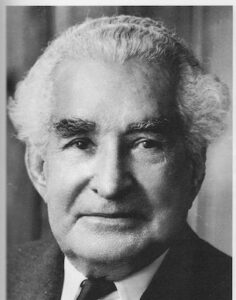
William Bustamante
*William Bustamante was born on February 24, 1884. He was a Creole Jamaican politician and leader of the Labor Party.
William Alexander Clarke Bustamante was born in Jamaica to Mary Clarke (née Wilson), a woman of mixed race, and her husband, Robert Constantine Clarke, a White Irish Catholic. His grandmother, Elsie Clarke-Shearer, was also the grandmother of Norman Washington Manley. Bustamante did not leave Jamaica until 1905, when he was 21 years old, and he went as part of the early Jamaican migration to Cuba, where employment opportunities in the sugar industry were expanding.
He returned to Jamaica permanently in the 1930s. Bustamante became an activist against colonial rule by writing frequent letters on the issues to the Daily Gleaner newspaper. In 1937, he was elected as treasurer of the Jamaica Workers' Union (JWU). During the 1938 labor rebellion, he quickly became identified as the spokesman for striking workers, who were mostly of African and mixed-race. JWU became the Bustamante Industrial Trade Union (BITU) after the revolt. In 1940, he was imprisoned for subversive activities, defended by N.W. Manley was released from prison in 1943. Bustamante founded the Jamaica Labor Party the same year. Previously, he had belonged to the People's National Party (founded in 1938).
In the 1944 Jamaican general election, Bustamante's party won 22 of 32 seats in the first House of Representatives elected by universal suffrage. He became the unofficial leader of the government, representing his party. Under the new charter, the British governor, assisted by the six-member Privy Council and ten-member Executive Council, remained responsible solely to the Crown. The Jamaican Legislative Council became the upper house, or Senate, of the bicameral Parliament. House members were elected by adult suffrage from single-member electoral districts, known as constituencies. Despite these changes, ultimate power remained concentrated in the hands of the governor and other high officials. He was acquitted.
In 1952, he was arrested by American authorities while he was on official business in Puerto Rico. In the 1949 Jamaican general election, the PNP received more votes, but the JLP secured more seats; 17 to the PNP's 13. Independents won two seats. The voter turnout was 65.2%. The parties lobbied the colonial government for a further increase in constitutional powers for the elected government. In June 1953, a new constitution was enacted, providing for the appointment of a chief minister and seven other Ministers from the elected House of Representatives. They now had a majority over the official and nominated members. For the first time, the Ministers could now exercise wide responsibility in the management of the island's internal affairs.
The only limits placed on their powers pertained to public security, public prosecutions, and matters affecting members of the Civil Service, which still fell under the jurisdiction of the Colonial Secretary. In 1953, Bustamante became Jamaica's first chief minister (the pre-independence title for head of government). Bustamante held this position until the JLP was defeated in 1955. In the 1955 Jamaican general election, the PNP won for the first time, securing 18 out of 32 seats. The JLP ended up with 14 seats, and there were no independents. The voter turnout was 65.1%. As a result, Norman Manley became the new chief minister. In the 1959 Jamaican general election, the number of seats was increased to 45. The PNP secured a wider margin of victory, taking 29 seats to the JLP's 16.
Bustamante was commended in 1955 for his public services in Jamaica. He was awarded an honorary LLD degree from Fairfield University in 1963 and the University of the West Indies in 1966. In the same year, he was also awarded the Special Grand Cordon of the Order of Brilliant Star by the Republic of China. In 1967, Bustamante was appointed a Knight Grand Cross of the Order of the British Empire (GBE). In 1969, Bustamante became a Member of the Order of National Hero (ONH). His portrait is on the Jamaican one-dollar coin and one-thousand-dollar note, alongside Norman Manley. William Bustamante died on August 6, 1977, and was buried in the National Heroes Park in Kingston.